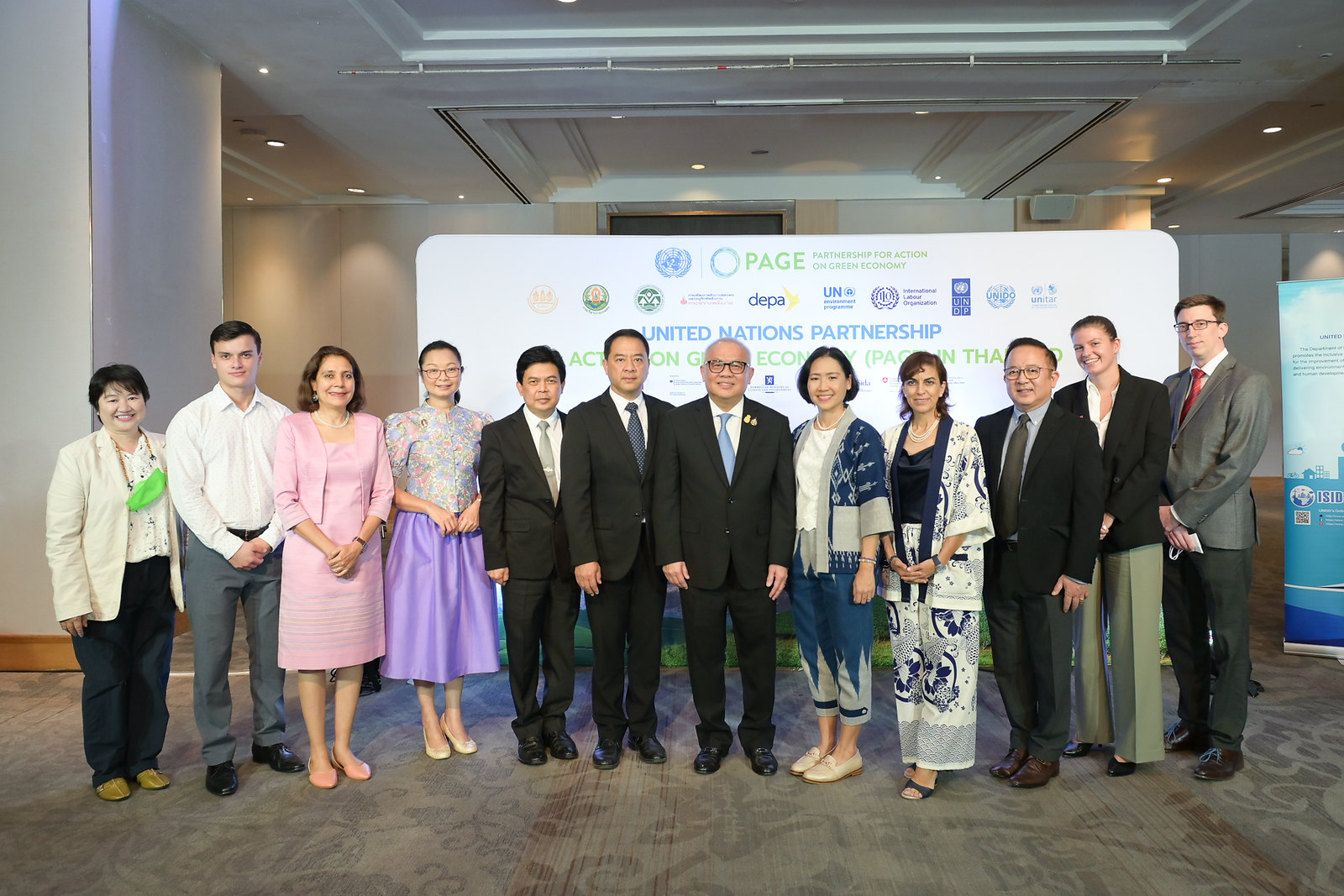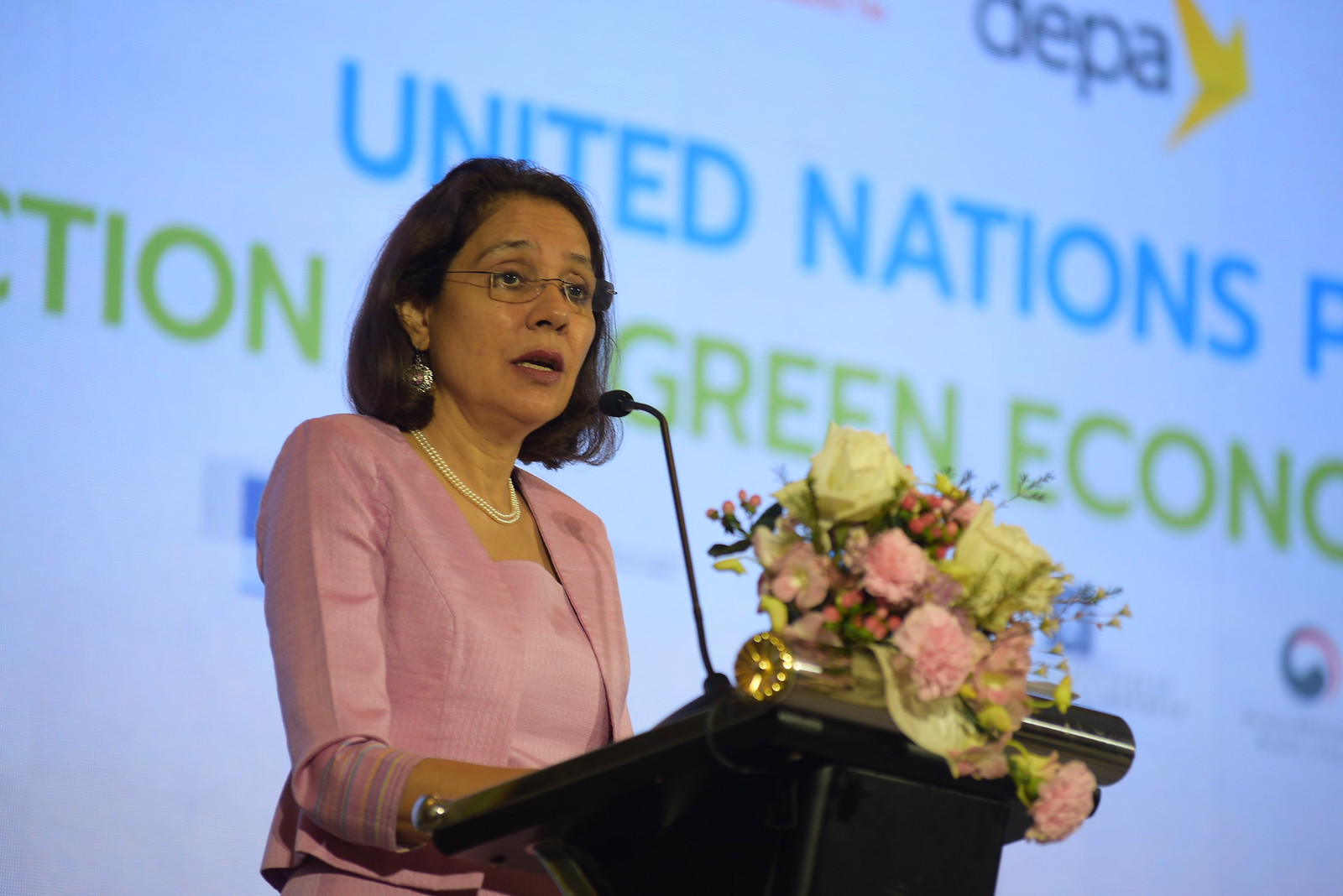PAGE Thailand officially launched on November 10 the implementation phase of the PAGE Work plan relating to green economic transformation in Thailand. The launch has marked an important step in accelerating partnerships and investments towards the green economy and green recovery policies in Thailand. The event aimed to better inform about PAGE green economy and green recovery work progress and upcoming activities in the country. A focus of the event was to take stock of progress made so far on the Inclusive Green Economy (IGE), Green Recovery Learning Needs Assessment, and Green Recovery Assessment of projects under the rehabilitation fund.
Deputy Prime Minister and Minister of Energy Mr. Supattanapong Punmeechaow presided the ceremony, hosted by the Office of the National Economic and Social Development Council (NESDC) and the United Nations Industrial Development Organization (UNIDO). “Everyone has to work together with a full intention, full committement and engagement to achieve this challenging target when we achieve, we will be proud of it because this is not for us, but for our future”, he stressed
The government’s mission is to improve the economic and social well being of people and the quality of the environment in Thailand, Supattanapong said. The focus of government policies also lies on strengthening the country’s capacity to be adaptive and resilient in a post-pandemic world of economic, environmental and technological disruptions. This mission is clearly laid out in the 13th National Economic and Social Development Plan, undertaken by NESDC. One of the key expected outcomes, which aligns with support from PAGE, involves progress on sustainable development and climate action, the minister noted.
Thailand has decided to embark on its Bio-Circular-Green Economy Model (BCG) in alignment with the 13th national plan so as to enhance the resource efficiency of natural assets, capitalize on the country’s strengths in biological diversity and cultural richness, and employ technology and innovation towards a value-based and innovation-driven economy, according to Supattanapong. The model has been inspired by the Sufficiency Economy Philosophy (SEP), the key pillar of Thailand’s social and economic development which is aligned with the UN’s Sustainable Development Goals (SDGs).
The model has been inspired by the Sufficiency Economy Philosophy (SEP), the key pillar of Thailand’s social and economic development which is aligned with the UN’s Sustainable Development Goals (SDGs).
PAGE Thailand is targeting the implementation of the inclusive green economy in five key areas: 1) reduction of carbon emissions and pollution; 2) energy and resource efficiency promotion; 3) biodiversity and ecosystem conservation; 4) decent job creation; and 5) a just transition to equality and prosperity for all. These areas of action are aimed at overcoming the challenges of poverty, social inequality and environmental degradation while generating sustainable economic growth in line with environmentally-friendly and socially just principles.
The first aims to construct a Carbon Emission Trading Scheme, or ETS, to act as a mandatory carbon cap and trade for major carbon emitters.The second seeks to facilitate sustainable waste management with proper financing mechanisms.The third involves capacity-building for the green economy through training in economic circularity in the agricultural and other key sectors. And the fourth entails raising awareness through public outreach campaigns, advocacy, and dialogues with local and national partners.
PAGE partners are inviting all key actors to join this national drive synergistically towards an inclusive green economy that pursues sustainability, equality and resource efficiency for the sake of future generations. “Thanks to all the collaborations with stakeholders that are joining forces to put green economic policies and practices into action, we are creating a low-carbon society, improving resource efficiency, promoting clean production technologies and inspiring green consumption trends that will contribute to sustainable and long-term economic, social and environmental development,” said Ms. Sooksiri Chamsuk, Deputy Representative, UNIDO.
The event also served as a platform for future collaborations among stakeholders around policies and investments in the green economy and green recovery with the aim of strengthening partnerships for synergistic actions towards an integrated green economy based on the SDGs. It brought together UN agencies, policymakers, practitioners, researchers, investors, and other key actors from governments, private sector, academia, think tank, social organization, press and media.
The UN country team on site played also an active role in the event with the presence of several representatives of the UN, including UNRC in Thailand. “UNIDO, UNEP, UNDP, UNITAR, ILO are all committed to successfully contribute to building Thailand’s inclusive green economy through PAGE” reaffirmed
Ms. Gita Sabharwal, UN Resident Coordinator highlighted PAGE work in her interventation “PAGE will be a critical platform to take [the green economy] agenda forward” and she stressed that “Thailand should continue to lead by example setting positive trends in line with the BCG”.
Dr. Cristina Martinez, Senior Specialist from the Regional Office for Asia and the Pacific (ILO) underlined the importance of dialogue when tackling climate change. “With a comprehensive and concerted policy action to address climate change we can bring positive durable change to well-being”, she said.
The opening event counted on the participation online and on-site of Mr. Stein Hansen, Regional Director and Representative (UNIDO), Dr. Cristina Martinez, Senior Specialist, Environment and Decent Work, Coordinator Green Jobs and Just Transition in Asia-Pacific, Regional Office for Asia and the Pacific (ILO), Mr. Adebiyi Odegbile, PAGE Secretariat, United Nations Environment Programme (UNEP), Mr. Stephan Sicars, Director, Division of Circular Economy & Environmental Protection, UNIDO & Member, PAGE Management Board and Ms. Gita Sabharwal, UN Resident Coordinator, Dr. Adis Israngkura Thailand Development Research Institute (TDRI), and Dr. Wichayayuth Boonchit, Chairman of the PAGE Thailand National Steering Committee on Partnership for Action on Green Economy (PAGE) and the Deputy Secretary General, Office of the National Economic and Social Development Council (NESDC) participated in the opening. Funding partners also attended the event.
Thailand joined PAGE in 2019. The Office of the National Economic and Social Development Council (NESDC) is the Government focal point for PAGE. UNDIO and ILO are leading implementing agencies. UNIDO acts as the main coordinating agency for the PAGE project in Thailand.
PAGE will also collaborate with Department of Alternative Energy Development and Efficiency (DEDE), Office of Natural Resources and Environmental Policy and Planning (ONEP), Department of Agriculture (DOA), Digital Economy Promotion Agency (DEPA), Thailand Development Research Institute (TDRI), Federation of Thai Industries (FTI), and Kenan Foundation Asia.
PAGE activities in Thailand plan to contribute towards the achievement of SDGs 4 (Quality Education), 8 (Decent Work and Economic Growth), 9 (Industry, Innovation and Infrastructure), 12 (Responsible Consumption and Production), 13 (Climate Action) and 17 (Partnerships for the Goals).
This launch event will be followed by a green jobs assessment consultation on November 21, and a public meeting about rehabilitation-funded project evaluation towards green recovery targets on November 28-30.
Source: UN Thailand, PAGE, NESDC






